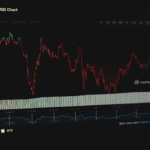
The world of digital assets is known for its high volatility, making it both an exciting and unpredictable market for long-term investors. However, there are tactical approaches that can help investors navigate these fluctuations while maintaining their focus on long-term growth. This blog will explore strategies such as dollar-cost averaging, rebalancing, and risk management techniques tailored to the crypto markets, which are vital for long-term success in digital asset investing.
Dollar-Cost Averaging (DCA): A Steady Approach
One of the most effective strategies to reduce the impact of volatility in digital assets is dollar-cost averaging (DCA). This involves investing a fixed amount of capital at regular intervals, regardless of the asset’s price. DCA allows investors to smooth out their entry points, buying more of an asset when prices are low and less when prices are high. Over time, this can reduce the average cost of investments, minimizing the impact of market volatility.
For example, a long-term Bitcoin fund investor using the DCA strategy may purchase Bitcoin weekly, avoiding the temptation to time the market. This disciplined approach helps reduce emotional decision-making, which is often driven by short-term price movements. By consistently investing, DCA helps spread out the risk over time, protecting investors from sharp market declines.
Rebalancing Your Digital Asset Portfolio
Rebalancing is another key strategy to manage volatility in the digital asset market. As prices fluctuate, the value of different assets in a portfolio can shift, potentially altering the risk profile of the portfolio. Rebalancing involves periodically adjusting the portfolio to bring asset allocations back in line with the original strategy.
For instance, if an investor has allocated 60% of their portfolio to Bitcoin and 40% to stablecoins, and the price of Bitcoin rises significantly, the portfolio may now be skewed with 80% in Bitcoin. Rebalancing by selling a portion of Bitcoin and buying more stablecoins can help maintain the desired risk level. This tactical adjustment ensures that investors don’t become overly exposed to any single asset class due to market movements.
Risk Management Techniques for Digital Assets
In the high-risk environment of digital assets, having a solid risk management strategy is crucial. One of the most important techniques is setting clear investment goals and understanding risk tolerance. Digital assets can be particularly volatile, and it’s essential for long-term investors to have realistic expectations about potential losses and gains.
Another risk management approach is diversification. By spreading investments across various types of digital assets—such as Bitcoin, altcoins, and stablecoins—investors can reduce their exposure to the volatility of any single asset. In addition, incorporating real-world asset tokenization or security tokens can further diversify a portfolio, lowering overall risk.
Finally, setting stop-loss orders can help investors limit potential losses in times of extreme volatility. A stop-loss order automatically sells a digital asset when its price falls to a predetermined level, preventing further losses.
Embrace the New Era of Digital Asset Management
Join Kenson Investments and explore innovations in the blockchain and digital assets sector. Our digital asset specialists are here to help you navigate the complexities of digital asset portfolios and defi services.
Call now to discover how we’re moving the industry forward!
Disclaimer: The information provided on this page is for educational and informational purposes only and should not be construed as financial advice. Cryptocurrency assets involve inherent risks, and past performance is not indicative of future results. Always conduct thorough research and consult with a qualified financial advisor before making investment decisions.
“The cryptocurrency and digital asset space is an emerging asset class that has not yet been regulated by the SEC and US Federal Government. None of the information provided by Kenson LLC should be considered financial investment advice. Please consult your Registered Financial Advisor for guidance. Kenson LLC does not offer any products regulated by the SEC, including equities, registered securities, ETFs, stocks, bonds, or equivalents.”














